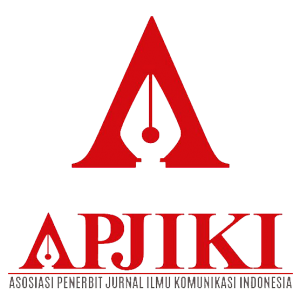Crowdfunding sebagai Bentuk Budaya Partisipatif pada Era Konvergensi Media: Kampanye #BersamaLawanCorona (Kitabisa.com)
Abstract
Keywords
Full Text:
PDFReferences
Abdillah, F., & Danial, E. (2015). Crowdfunding: Demokratisasi Akses Keuangan dalam Mendukung Aksi Sosial Mahasiswa. Jurnal Ilmiah Mimbar Demokrasi, 15(1).
Adiansah, W., Mulyana, N., & Fedryansyah, M. (2016). Potensi Crowdfunding di Indonesia dalam Praktik Pekerjaan Sosial. In Prosiding KS: Riset & PKM (hal. 155–291).
Arifin, S. R., & Wisudanto. (2017). Crowdfunding sebagai Alternatif Pembiayaan Pembangunan Infrastruktur. In Prosiding Simposium II - UNIID (hal. 309–314). Palembang.
Aziz, I. A., Nurwahidin, N., & Chailis, I. (2019). Faktor-Faktor yang Mempengaruhi Masyarakat Menyalurkan Donasi Melalui Platform Crowdfunding Berbasis Online. Jurnal Syarikah, 5(1), 94–108. https://doi.org/10.30997/jsei.v5i1.1835
Belleflamme, P., Lambert, T., & Schwienbacher, A. (2014). Crowdfunding: Tapping the right crowd. Journal of Business Venturing, 29, 585–609. https://doi.org/10.1016/j.jbusvent.2013.07.003
Budiman, T., & Octora, R. (2019). Perlindungan Hukum Bagi Donatur dalam Kegiatan Donation Based Crowdfunding Secara Online. Jurnal Kertha Patrika, 41(3), 222–237.
Chakaveh, S., & Bogen, M. (2007). Media Convergence, an Introduction. In Lecture Notes in Computer Science (including subseries Lecture Notes in Artificial Intelligence and Lecture Notes in Bioinformatics) (Vol. 4552 LNCS, hal. 811–814). https://doi.org/10.1007/978-3-540-73110-8_88
Chang, S. E. (2018). Regulation of Crowdfunding in Indonesia. Law Review, XVIII(1), 41–71.
Choy, K., & Schlagwein, D. (2016). Crowdsourcing for a better world: On the relation between IT affordances and donor motivations in charitable crowdfunding. Information Technology & People, 29(1), 221–247. https://doi.org/10.1108/ITP-09-2014-0215
CNN Indonesia. (2020). Jokowi Umumkan Dua WNI Positif Corona di Indonesia. Diambil 24 Maret 2020, dari https://www.cnnindonesia.com/nasional/20200302111534-20-479660/jokowi-umumkan-dua-wni-positif-corona-di-indonesia
DP, M. (2020). Masker dan Hand Sanitizer Mahal dan Langka Karena Virus Corona: Awas, Ini Ancaman Penjara bagi Penimbun Masker dan Hand Sanitizer. Diambil 24 Maret 2020, dari https://www.grid.id/read/042047754/masker-dan-hand-sanitizer-mahal-dan-langka-karena-virus-corona-awas-ini-ancaman-penjara-bagi-penimbun-masker-dan-hand-sanitizer
Dresner, S. (2014). Crowdfunding: A Guide to Raising Capital on the Internet. New Jersey: John Wiley & Sons.
Dzulfaroh, A. N. (2020). Virus Corona Jadi Pandemi Global, Apa Dampak dan Langkah Selanjutnya? Diambil 23 Maret 2020, dari https://www.kompas.com/tren/read/2020/03/12/064800265/virus-corona-jadi-pandemi-global-apa-dampak-dan-langkah-selanjutnya-
Gea, F. D. S. (2016). Crowdfunding: Gerakan Baru Kegotongroyongan di Indonesia (Tinjauan Evolusi Gerakan Aksi Kolektif dalam Media Baru). In Prosiding Konferensi Nasional Sosiologi V Asosiasi Program Studi Sosiologi Indonesia. Padang.
Gilson, L. L., & Goldberg, C. B. (2015). Editors’ Comment: So, What Is a Conceptual Paper? Group & Organization Management, 40(2), 127–130. https://doi.org/10.1177/1059601115576425
Gleasure, R., & Feller, J. (2016). Does Heart or Head Rule Donor Behaviors in Charitable Crowdfunding Markets? International Journal of Electronic Commerce, 20(4), 499–524. https://doi.org/10.1080/10864415.2016.1171975
Gras, D., Nason, R. S., Lerman, M., & Stellini, M. (2017). Going offline: broadening crowdfunding research beyond the online context. Venture Capital, 19(3), 217–237. https://doi.org/10.1080/13691066.2017.1302061
Hariyani, I., & Serfiyani, C. Y. (2015). Perlindungan Hukum Sistem Donation Based Crowdfunding pada Pendanaan Industri Kreatif di Indonesia. Jurnal Legislasi Indonesia, 12(4), 353–361.
Hemer, J. (2011). A snapshot on crowdfunding (No. R2/2011). Karlsruhe. Diambil dari https://www.econstor.eu/bitstream/10419/52302/1/671522264.pdf
Hutami, N., & Irwansyah. (2019). Pemanfaatan Aplikasi Mobile Kitabisa dalam Pelaksanaan Crowdfunding di Indonesia. Komunikasi, XIII(2), 183–194.
Ibrahim, N. (2013). Platform Crowdfunding Berbasis Web untuk Donasi, Sponsorship, dan Pendanaan UKM. In Proceedings Konferensi Nasional Sistem Informasi (KNSI) (hal. 216–220). Mataram.
Irfan, M. (2016). Crowdfunding sebagai Pemaknaan Energi Gotong Royong Terbarukan. Share: Social Work Jurnal, 6(1), 1–153.
Jenkins, H., Purushotma, R., Weigel, M., Clinton, K., & Robison, A. J. (2009). Confronting the Challenges of Participatory Culture: Media Education for the 21st Century. Cambridge: MIT Press.
Kim, T., Por, M. H., & Yang, S. (2017). Winning the crowd in online fundraising platforms: The roles of founder and project features. Electronic Commerce Research and Applications, 25, 86–94. https://doi.org/10.1016/j.elerap.2017.09.002
Safhira, V. E. (2020). Bagikan Curhatan Tenaga Medis COVID-19 Indonesia yang Kekurangan Alat Memadai, Donna Agnesia: Jangan Sampai Corona Matikan Empati Kita. Diambil 24 Maret 2020, dari https://www.pikiran-rakyat.com/entertainment/pr-01353741/bagikan-curhatan-tenaga-medis-covid-19-indonesia-yang-kekurangan-alat-memadai-donna-agnesia-jangan-sampai-corona-matikan-empati-kita?page=all
Sitanggang, M. H. A. (2018). Memahami Mekanisme Crowdfunding dan Motivasi Berpartisipasi dalam Platform Kitabisa.com. E Journal UNDIP, 23(3), 1–11. Diambil dari https://ejournal3.undip.ac.id/index.php/interaksi-online/article/view/20859/19553
Trivedi, B., & Thaker, K. (2001). Social Dimensions of Media Convergence in India. Media Asia, 28(3), 157–162. https://doi.org/10.1080/01296612.2001.11726645
Wong, S. H. R. (2012). Which platform do our users prefer: website or mobile app? Reference Services Review, 40(1), 103–115. https://doi.org/10.1108/00907321211203667
DOI: https://doi.org/10.36080/ag.v8i1.985
Refbacks
- There are currently no refbacks.
Copyright (c) 2020 Avant Garde

This work is licensed under a
Creative Commons Attribution-ShareAlike 4.0 International License. Visit to our university official website: www.budiluhur.ac.id





